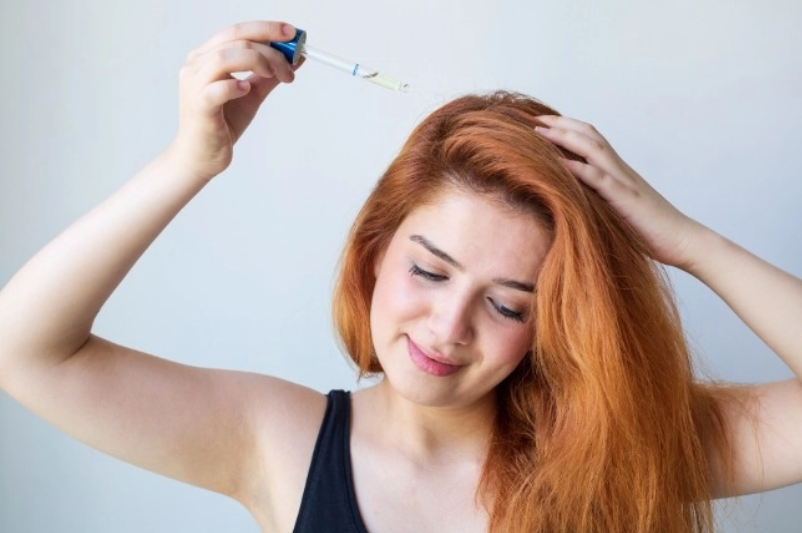
Question from Erika to the topic: In what cases are therapeutic shampoos used. Question: "More than once I have found in different sources advice on the use in home procedures of nicotinic acid to stimulate hair growth. Is it worth trying or is it just another legend on the net?»
Short answer: It's not just a legend, nicotinic acid (niacin) actually has scientifically proven potential to stimulate hair growth. But its use is risky and requires extreme caution.
Now for the details.
How does it (supposedly) work?
Nicotinic acid is vitamin B3 (PP). The mechanism of its action on hair is as follows:
- Strong vasodilator action: This is the key effect. When applied to the skin, nicotinic acid causes a powerful blood flow to the treated area (hyperemia). This is accompanied by a characteristic redness, burning and tingling sensation.
- Improved microcirculation: Increased blood flow means a better supply of oxygen and nutrients to the hair follicles.
- Stimulation of metabolism in follicles: Improved nutrition can activate metabolism in follicle cells, potentially moving hair from the resting (telogen) phase to the growth (anagen) phase.
What does the science say?
- There are studies showing positive effects. For example, some clinical studies have demonstrated an increase in hair density and volume with nicotinic acid products in people with androgenetic alopecia (male and female pattern baldness).
- The effect is neither guaranteed nor universal. Most studies are small and the response is highly individualized. What helped one person may not help another.
The main "BUTs" and risks of home application
That's why blindly following advice from the web can be dangerous:
1. Severe adverse skin reactions:
- Hyperemia: Severe redness, burning, and itching are normal reactions, but they can be very intense and uncomfortable.
- Dryness and irritation: Nicotinic acid can be very drying to the scalp, leading to flaking, tightness and even dermatitis.
- Allergic Reactions: Rash, hives and more serious allergic manifestations may occur.
2. Unpredictable concentration. Pharmacies sell solutions for injection (in ampoules) with different concentrations (usually 1%). Using this form for the skin is a lottery, as it is not intended for external use and may contain excipients that will cause irritation.
3. Deterioration of condition. If used improperly (too often, high concentration), you can seriously damage the skin barrier, cause inflammation and aggravate hair loss.
4. Incompatibility with other procedures. It should not be used together with other potent agents (e.g. minoxidil, acids) as the reaction can be unpredictable.
So is it worth trying? How to make an informed decision:
You don't want to start with a pure drugstore solution. This is too aggressive and risky a method.
A safe strategy if you do venture out:
- Consultation with a trichologist or dermatologist. This is rule #1. The doctor will be able to determine the cause of hair loss and say whether nicotinic acid will be at least somewhat effective in your case.
- Selection of ready-made cosmetic products. It is much safer to look not for ampoules in the pharmacy, but ready-made serums and lotions for hair growth from cosmetic brands, in the composition of which nicotinic acid is listed as one of the components. In this case, its concentration and formula are balanced and tested for external use.
- Performing an allergy test. If you use a ready-made remedy or, ignoring all warnings, a diluted pharmacy solution, necessarily Apply a small amount to the skin behind the ear or on the inner crease of the elbow for 24 hours to monitor the reaction.
- Start with low doses and low frequency. For example, use the product not every day, but 2-3 times a week, carefully observing the skin reaction.
Conclusion
Nicotinic acid for hair growth - it's not a myth, it's a potentially working but aggressive remedy..
It is not recommended for self-administration in the form of pharmacy ampoules due to high risks of severe irritation and scalp damage.
It is recommended to look for it in the composition of ready-made cosmetic products designed for scalp care, and consult a specialist before starting any experiment.
Remember that hair loss has dozens of causes (hormones, stress, vitamin deficiencies, diseases), and "blind" stimulation without addressing the underlying problem is often useless and even harmful.






